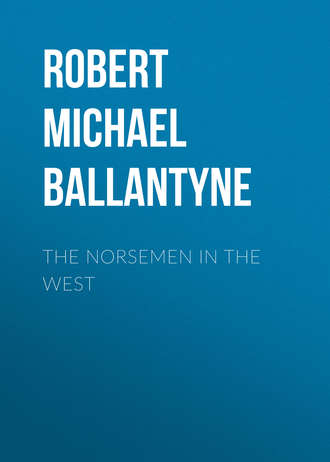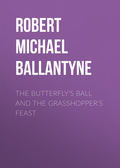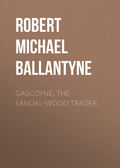
Robert Michael Ballantyne
The Norsemen in the West
Chapter Nine.
The First Night in Vinland
The prize which had thus fallen into the hands of the Norsemen was of great importance, because it furnished a large supply of food, which thus enabled them to go leisurely to work in establishing themselves, instead of, as would otherwise have been the case, spending much of their time and energy in procuring that necessity of life by hunting and fishing.
It was also exceedingly fortunate that the whale had been killed a little before the time of high water, because that enabled them to fasten ropes through its nose and row with it still farther in to the shore. This accomplished, the boats made several trips back to the ship and landed all the men, and these, with a number of ropes, hauled up the carcase foot by foot as the tide rose. After reaching a certain point at high water they could get it up no farther, and when the tide turned all the men twice doubled could not have budged it an inch. The ropes were therefore tied together and lengthened until they reached a strong tree near the beach, to which they were fastened.
Leaving their prize thus secured they hastened back to the ship, hauled up the anchor, and made for the mouth of the river, but they had lost so much of the flood-tide, in consequence of their battle with the whale, and the evening was so far advanced, that they resolved to delay further proceedings until the following day.
The ship was therefore hauled close in to the land at the river’s mouth and allowed to take the ground on a spit of sand. Here the men landed and soon built up a pile of stones, between which and the ship a gangway was made. The women were thus enabled to walk comfortably ashore. And here, on a grassy spot, they pitched their tents for the first time in Vinland.
Provisions were now brought on shore and large fires were kindled which blazed up and glared magnificently as the night drew on, rendering the spit of sand with the grassy knoll in the centre of it quite a cheerful and ruddy spot. A few trees were cut down and stretched across the spit at its neck on the land side, and there several sentinels were placed as a precaution—for which there seemed little occasion.
Karlsefin then set up a pole with a flag on it and took formal possession of this new land, after which the whole colony sat down on the grass—some under the tents, others under the starry sky—to supper. The cattle, it may here be noted, were not landed at this place, as they were to be taken up the river next day, but their spirits were refreshed with a good supply of new-mown grass, so that it is to be hoped, and presumed, they rejoiced not less than their human companions in the satisfactory state of things.
In the largest tent, Karlsefin, Biarne, Thorward, Gudrid, Freydissa, Astrid, and Olaf, sat down to a sumptuous repast of dried Greenland-fish and fresh Vinland-whale, besides which they had soup and beer. Being healthy and hungry, they did full justice to the good things. Bertha and Thora served and then joined in the repast.
“This is pleasant, isn’t it, Freydissa?” asked Biarne, with his mouth full.
Freydissa, with her mouth not quite so full, admitted that it was, for she happened to be in an amiable humour—as well she might!
“Come, let us pledge the new land in a can of beer,” cried Biarne, pouring the beverage out of an earthenware jar into a squat old Norse flagon of embossed silver. “Thorward, fill up!”
“I will join you heartily in that,” cried Thorward, suiting the action to the word.
“And I,” said Karlsefin, raising an empty flagon to his lips, “will pledge it in a wish. I wish—prosperity to Vinland!”
“Come, Karlsefin,” remonstrated Biarne, “forego austerity for once, and drink.”
“Not I,” returned the skipper, with a laugh.
“Wherefore not?”
“First, because a wish is quite as potent as a drink in that respect; second, because our beer is nearly finished, and we have not yet the means to concoct more, so that it were ill-advised to rob you, Biarne, by helping to consume that which I do not like; and, last of all, I think it a happy occasion this in which to forswear beer altogether!”
“Have thy way,” said Biarne, helping himself to another whale-steak of large dimensions. “You are too good a fellow to quarrel with on such trifling ground. Here, pass the jar, Thorward; I will drink his portion as well as my own.”
“And I will join you both,” cried little Olaf with a comical turn of his eyebrows. “Here, I wish prosperity to Vinland, and drink it, too, in water.”
“We can all join thee in that, Olaf,” said Gudrid I with an approving nod and laugh. “Come, girls, fill up your cups and pledge to Vinland.”
“Stop!” shouted Biarne in sudden anxiety.
They all paused with the cups half-way to their lips.
“You must not drink, Freydissa,” he continued seriously. “Gudrid did call upon the girls to join her: surely ye don’t—”
He was cut short by Freydissa throwing her cup of water in his face.
With a burst of laughter Biarne fell backwards, and, partly to avoid the deluge, partly for fun, rolled out of the tent, when he got up and dried his dripping beard.
“No more of that, fair girl, I beseech thee,” he said, resuming his place and occupation. “I will not again offend—if thou wilt not again misunderstand!”
Freydissa made no reply to this, silence being her usual method of showing that she condescended to be in good humour—and they were all very merry over their evening meal. From the noise and laughter and songs around them, it was evident that the rest of the company were enjoying their first night on shore to the full, insomuch that Olaf was led, in the height of his glee, to express a wish that they could live in that free-and-easy fashion for ever.
“’Tis of no use wishing it,” observed Karlsefin; “if you would insure success you must, according to Biarne, drink it in beer.”
“I cry you mercy, skipper,” said Biarne; “if you persecute me thus I shall not be able to drink any more to-night. Hand me the jar, Thorward, and let me drink again before I come to that pass.”
“Hark!” exclaimed Gudrid, “there must be something going to happen, for all the men have become suddenly quiet.”
They listened intently for a moment or two, when Krake’s voice broke the deep silence:– “Come, now, don’t think so long about it, as if ye were composing something new. Every one knows, sure, that it’s about sweet Scotland you’re going to sing.”
“Right, Krake, right,” replied a rich deep voice, which it required no sight to tell belonged to Hake, the young Scot; “but there are many songs about sweet Scotland, and I am uncertain which to choose.”
“Let it be lively,” said Krake.
“No, no, no,” chorussed some of the men; “let it be slow and sad.”
“Well well,” laughed the half-Irishman—as he was fond of styling himself—“have it your own way. If ye won’t be glad, by all means be sad.”
A moment after, Hake’s manly tones rose on the still air like the sound of an organ, while he sang one of the ancient airs of his native land, wherein, like the same airs of modern days, were sounded the praises of Scotland’s heather hills and brawling burns—her bonny daughters and her stalwart sons.
To those in the large tent who had listened, with breathless attention and heads half averted, it was evident that song, sentiments, and singer were highly appreciated, from the burst of hearty applause at the conclusion, and the eager demand for another ditty. But Hake protested that his ruling motto was “fair play,” and that the songs must circle round.
“So let it be,” cried Swend.—“Krake, it is your turn next.”
“I won’t keep ye waiting,” said that worthy, “though I might do it, too, if I was to put off time selecting from the songs of old Ireland, for it’s endless they are—and in great variety. Sure, I could give ye songs about hills and streams that are superior to Scotland’s burns and braes any day—almost up to those of Gamle Norge if they were a bit higher—the hills I mean, not the songs, which are too high already for a man with a low voice—and I could sing ye a lament that would make ye shed tears enough to wash us all off the spit of land here into the sea; but that’s not in my way. I’m fond of a lively ditty, so here you are.”
With that Krake struck up an air in which it was roundly asserted that Ireland was the finest country in the world (except Iceland, as he stopped in his song to remark); that Irish boys and girls lived in a state of perpetual hilarity and good-will, and that the boys displayed this amiable and pleasant condition chiefly in the way of kissing the girls and cracking each other’s crowns.
After that, Swend was called on to sing, which he did of Norway with tremendous enthusiasm and noise but little melody. Then another man sang a love-ditty in a very gruff voice and much out of tune, which, nevertheless, to the man’s evident satisfaction, was laughingly applauded. After him a sentimental youth sang, in a sweet tenor voice, an Icelandic air, and then Tyrker was called on to do his part, but flatly refused to sing. He offered to tell a saga instead, however, which he did in such a manner that he made the sides of the Norsemen ache with laughter—though, to say truth, they laughed more at the teller than the tale.
Thus with song and saga they passed the first hours of the night, while the camp-fires blazed ruddily on their weather-beaten faces, and the heavenly constellations shone, not only on the surrounding landscape, but appeared to light up another world of cloudland beneath the surface of the sleeping sea.
At last Karlsefin went out to them.
“Now, lads,” said he, “it is high time that you laid your heads on your pillows. Men who do not sleep well cannot labour well. To-morrow we have hard work before us in taking possession and settling our new home. God has prospered us thus far. We have made a good beginning in Vinland. May it be the foretaste of a happy ending. Away, then, and get you to rest before the night is older, and let your sleep be sound, for I will see to it that the sentinels posted round the camp are vigilant.”
The men received this brief speech with a murmur of willing acquiescence, and at once obeyed the order; though Krake observed that he fell in with the custom merely out of respect to the opinions of his comrades, having himself long ago learned to do without sleep in Ireland, where the lads were in the habit of working—or fighting—all day, dancing all night, and going home with the girls in the morning! Each Norseman then sought a spot upon the grassy knoll suited to his taste; used his arm, or a hillock, or stone, for a pillow, or anything else that came conveniently to hand, and with his sword or axe beside him, and his shield above him as a coverlet, courted repose, while the bright stars twinkled him to sleep, and the rippling wavelets on the shore discoursed his lullaby.
Chapter Ten.
Taking Possession of the New Home, an Event which is Celebrated by an Explosion and a Reconciliation
Every one knows—at least a well-known proverb assures us—that “early to bed and early to rise” conduces to health, wealth, and wisdom. The Norsemen of old would appear to have been acquainted with the proverb and the cheering prospect it holds out; perhaps they originated it; at all events, that they acted on it, and probably experienced the happy results, is evident from the fact that Karlsefin and his men not only went to bed in good time at night—as related in the last chapter—but were up and doing by daybreak on the following morning.
Having roused the women, relieved the sentinels, struck the tents, and carried everything safely on board the Snake, they manned the oars, or large sweeps, with the stoutest of the crew, and prepared to row their vessel up the river into the lake on the shores of which they designed to fix their future home. Previous to this, however, a party of men were told off to remain behind and cut up the whale, slice the lean portions into thin layers, and dry them in the sun for winter use.
“See that you make a good job of it,” said Karlsefin to Swend, who was left behind as the leader of the whale-party—because he was fat, as Krake said, and, therefore, admirably suited for such work—“and be careful not to let sand get amongst the meat. Cut out the whalebone too, it will be of use to us; and don’t forget that there may be enemies lurking in the woods near you. Keep your windward eye uncovered, and have your weapons always handy.”
Swend promised to attend to these orders, and, with twenty men, armed with axes, scythes, and large knives, besides their swords, shields, bows and arrows, stood on the ness and cheered their comrades as they rowed away.
The force of the current was not great, so that the Snake made rapid progress, and in a few hours reached the place where the small stream forked off from the main river. This they named Little River. Above that point the current was more rapid, and it became necessary to send a large party of men on shore with a tracking-rope, by means of which and the oars they at last overcame all obstacles, and finally swept out upon the bosom of the beautiful sheet of water which had afforded such delight to the eyes of the two Scots.
“Here, then, we have got home at last,” said Karlsefin, as they rowed over the still water to a spit, or natural landing-place, near Leif’s old booths.
“It is very beautiful,” said Gudrid, “but I find it difficult to call it home. It seems so strange, though so pleasant.”
“You were always difficult to please, Gudrid,” said Freydissa; “surely you don’t think Greenland—cold, windy, bleak, nasty Greenland—a better home than this?”
“Nay, sister, I made no comparison. I did but say that it seemed strange, and I’m sure that Bertha agrees with me in that—don’t you, Bertha?”
“Indeed I do,” replied the maiden; “strange the land is, but beautiful exceedingly.”
“Of course she’ll agree with what you say,” cried Freydissa, testily. “I would that she agreed as readily with me. It is a wonder that she is not weeping, as she is always so ready to do on the smallest provocation, or without any provocation at all.”
“I only wept on leaving my father,” remonstrated Bertha with a winning smile. “I’m sure you have not seen me shed a tear since then. Besides, I do agree with you in this case, for I think Vinland will be a pleasant home. Don’t you too?” she added, turning round to Thora, who had been standing at her side, but Thora had moved away, and her place had been taken by Hake, the Scot.
Bertha blushed on meeting the youth’s gaze, and the blush deepened when Hake said in a quiet undertone, that Vinland could not but be a pleasant home to him, and added that Greenland, Iceland, Norway,—anywhere,—would be equally pleasant, if only she were there!
Poor Bertha was so taken aback by the cool and sudden boldness of this unexpected reply, that she looked hastily round in alarm lest it had been overheard; but Hake, not intending that it should be overheard, had addressed it to her ear, and fortunately at the moment the grating of the keel upon the pebbly shore drew the attention of all to the land.
“Now, then, jump ashore, lads,” cried Biarne, “and get out the gangway. Make it broad, for our cattle must not be allowed to risk their limbs by tumbling off.”
While Biarne superintended the gangway, Thorward prepared the live stock for their agreeable change, and Karlsefin went up to examine the state of the huts. They were found to be in excellent condition, having been well built originally, and the doors and windows having been secured against the weather by those who had used them last.
“No natives can have been here,” observed the leader of the party to those who accompanied him, “because every fastening is secured, apparently, as it was left.”
“Nevertheless, Sigrid and I have seen footprints in the sand,” remarked the woman Gunhild, coming up at that moment.
“Show them to me,” said Karlsefin, with much interest.
“Yonder they are,” replied the woman, pointing towards a sandy spot on her left, “and he who made them must have been a giant, they are so large.”
“Truly, a dangerous giant to meet with,” observed Karlsefin, laughing, when he reached the place, “these are none other, Gunhild, than the footprints of the bear that the two Scots sent away with the toothache. But come, we will open these huts and have them put in order and made comfortable against supper-time. So, get to work all of you and see how active you can be.”
While some of the party were busily engaged in sweeping out and arranging the huts, others shouldered their axes and went into the woods to cut down a few dead trees for firewood, and when the gangway between the ship and the shore was completed the live stock was driven on shore.
There was something quite impressive in this part of the landing. There was a deliberate slowness in the movements of most of the animals that gave to it quite the air of a solemn procession, and must have been a good illustration, on a small scale, of the issuing of the beasts from Noah’s Ark on the top of Ararat!
The first creature which, appropriately enough, led the van, was a lordly black bull. Little Olaf, whose tastes were somewhat peculiar, had made a pet of this bull during the voyage, and by feeding it, scratching it behind the ears, patting its nose, giving it water, and talking to it, had almost, if not altogether, won its affections. He was therefore permitted to superintend the landing of it.
“Come, get on, Blackie,” cried Olaf, giving the bull a push on the flank as it stood on the gangway with its head high, tail slightly raised, nostrils expanded, and eyes flashing. It glanced from side to side as if to take a general survey of its new domains.
Olaf advised it to “get on” again, but Blackie deigned to take no further notice than by a deep-toned internal rumbling.
“Not unlike Mount Hecla when it is going to explode,” said Biarne, laughing.
“Come back, boy, he will do you a mischief,” cried Gudrid in some alarm.
“Why, Olaf,” said Karlsefin, “your pet is going to be disobedient. Speak louder to him.”
Instead of speaking louder Olaf quietly grasped the brute’s tail and gave it a twist.
The effect was wonderful and instantaneous. The huge animal rushed wildly along the gangway, leaped across the beach, making the pebbles fly as he went, scampered over the green turf and plunged into the forest, kicking up his heels, flourishing his tail and bellowing in frantic delight!
Most of the cows went slowly and placidly along the gangway, and landed with easy-going satisfaction expressed in their patient faces, to the supreme contempt of Freydissa, who said she wished that they had all been bulls. There was one young heifer amongst them, however, which proved an exception to the rule. It glared savagely round, as if in imitation of the bull, refused point-blank to land, swerved from side to side of the gangway, backed right into the ship at the risk of its neck and limbs, attempted to charge the men, created dire confusion and alarm among the poultry, and finally fell off the gangway into the water, and scrambled on shore in a way that must have thrilled Freydissa’s heart with admiration—although she did not say so, but maintained a grim silence all the time.
Next came the sheep, which, owing perhaps to sea-sickness, or home-sickness, or some other cause, looked remarkably sheepish, and walked on shore with as much solemnity as if each had been attending the funeral of the rest. There were about twenty of these, and after them came a dozen or so of Icelandic ponies, which, although somewhat more active than the sheep, were evidently suffering in their spirits from the effects of the recent voyage. One of them, however, on feeling the soft turf under his feet, attempted to neigh, without much success, and another said something that sounded more like a horse-laugh than anything else.
Then followed the fowls, some of which walked, some flew, and others fluttered, according to their varying moods, with an immense deal of fuss and cackling, which was appropriately capped by the senior cock mounting on one of the huts and taking possession of the land with an ecstatic crow.
The procession was brought up by the ducks, which waddled out of the ship, some with an expression of grave surprise, some with “quacks” of an inquiring nature, others with dubious steps and slow, while a few, with an eye to the “main chance” made ineffectual dabs at little roughnesses in their pathway, in the hope that these might turn out to be edible.
At last all were landed and driven up into the woods, where they were left without any fear being entertained as to their going astray, seeing that they were guarded by several fine dogs, which were too much associated with the men as companions to be included in the foregoing list of the lower animals.
“Shall we set the nets?” said Hake, going up to Karlsefin, who was busy arranging the principal hut, while the men were bringing their goods and chattels on shore. “You know we saw a salmon leap from a pool on Little River. Doubtless they are in the lake also.”
“Try it, Hake, by all means. Go with your brother in the little boat and set them where you think best. Fresh salmon for supper would be a rare treat just now. Are you sure it was a salmon you saw, and not a large trout?”
“Sure? Ay, as sure as I am that a horse is not a cow,” replied Hake, smiling.
“Go then, and luck go with you.”
The nets were soon set in the bay, near the point of the ness on which the huts were built, and near to which a small mountain-stream entered the lake.
Suddenly a shrill angry voice was heard issuing from one of the smaller huts near the lake. It was Freydissa storming at poor Bertha. There was an occasional bass growl intermingled with it. That was Thorward remonstrating.
“Poor Bertha,” said Karlsefin to Biarne, who was standing beside him at the time, “she has a hard mistress.”
“Poor Thorward,” said Biarne, “he has a tough wife.”
“Thorward will cure or kill her,” rejoined Karlsefin, with a laugh. “He is a long-suffering man, and very tender to women withal, but he is not made of butter.”
Biarne shook his head. He evidently had not much opinion of Thorward’s resolution when opposed by the will and passion of such a termagant as Freydissa.
“How much better ’twould have been,” said he, “if Thorward had married her maid—the sweet little fair-haired blue-eyed Bertha.”
“Why, Biarne, methinks that thou art somewhat like to try that plan,” said his friend, looking at him in surprise, for he had spoken with much enthusiasm.
“Not I, man,” returned Biarne, with a smile and a shake of the head. “It is long since my heart was buried in Iceland. I am doomed to be an old bachelor now.”
They both listened at this point, for the domestic brawl in the small hut seemed to be waxing furious. Thorward’s voice was not heard so often, but when it did sound there was an unusually stern tone in it, and Freydissa’s became so loud that her words were audible.
“It has been killed, I tell you, Bertha, by sheer carelessness. If you had fed it properly it would have been as well as the others. Don’t say you did your best for it. You didn’t. You know you didn’t. You’re a smooth-faced vixen. You are. Don’t speak. Don’t speak back, I say. Hold your tongue. You killed that kitten by carelessness.”
“If you don’t hold your tongue, wife,” said Thorward, in a loud stern voice, “I’ll kill the cat too.”
There was a pause here, as if the threat had taken away Freydissa’s breath.
“Oho! that’s the poor little kitten,” whispered Karlsefin to Biarne, referring to one of a litter that had been born at sea, “that was nigh eaten by one of the dogs. Bertha had no hand in its death. I wonder it lived so long.”
“Kill the cat?” shrieked Freydissa, stamping her foot.
This was instantly followed by an unearthly caterwaul and the sudden appearance of a dark object in the air, which, issuing from the door of the hut, flew upwards like a sky-rocket, described a wide curve, and fell heavily about fifty yards out into the lake. Next moment Freydissa sprang from the hut and stood with clasped hands on the shore in speechless horror. Thorward immediately after came forth with a dark frown on his face, and walked away into the forest. Freydissa stood like a statue for some minutes, and then, seeing that the cat lay quite motionless, she turned, and, with a face that was deadly pale, re-entered the hut.
“It was cruel,” observed Karlsefin sadly.
“But salutary, perhaps,” said Biarne.
“It may be so,” rejoined the other; “but even if Thorward’s end be a good one, a right end does not justify a wrong action.—Ah! here comes sunshine. How goes it, Gudrid?”
Gudrid, who came forward at the moment, and knew nothing of what had occurred, said that she wanted Karlsefin’s help, if he could spare time, in order to arrange some of the fixtures in their new home.
Assuring her that she herself was the most valuable “fixture” in the house, Karlsefin left his work and the two walked off together, while Biarne went down to the ship.
Meanwhile Thorward returned to his hut, where he found Freydissa alone, sitting on a box with her face buried in her hands. She did not move, so he sat down beside her with a subdued look.
“Freydissa,” he said, “I’m sorry I did that. ’Twas cruel, ’twas hard; but it is done now, and can’t be undone. Forgive me, lass, if you can.”
She raised her head suddenly, and gazed at him with a flushed countenance.
“Thorward,” she said with energy, “if you had come with any other tone or word I would have hated you with all the power of my heart—”
“And that’s a strong power, Freydissa.”
“It is. But now—”
She threw her arms round her husband’s neck and kissed him. Thorward returned the kiss with the vigour of a man who is wont to give back more than he gets.
“Thanks, my girl,” said he, rising, “thanks. That puts my heart at ease. As for the poor cat, she’s beyond the influence of anger or repentance now; but trust me, Freydissa, I shall fetch you the handsomest cat that can be had for love or money in all Greenland, or Iceland; ay, even if I should have to make a special voyage to get hold of it.”
Thus did Thorward and Freydissa fall out, and thus were they reconciled, on the first day in their new home in Vinland.
Talking this matter over with Thorward next day, Karlsefin took occasion to give his friend some sage advice.
“Depend upon it, Thorward,” said he, “no good ever comes of quarrelling or violence, but, on the contrary, much evil. ’Tis well that you confessed your fault to her, else had she ever after held you in light esteem; because, although she deserved reproof, the cat did not deserve to be killed.”
“Beshrew me!”
“Nay,” interrupted Karlsefin, with a laugh, “that is the last thing you ought to say, seeing that you have had so much beshrewing already.”
“Well, well,” said Thorward, “thou art wonderfully smart at giving good advice.”
“Would that I could say thou wert equally smart at taking it! However, I have hope of thee, Thorward. Come, let us go see what the nets have produced. I observe Hake and Heika rowing to land.”
It was found that the fishermen had loaded their boat with magnificent trout of all sizes—some above five or six pounds’ weight—besides a large quantity of excellent fish of other kinds, but not a single salmon had been taken. Nevertheless they had good reason to be content with their success, for the supply was sufficient to provide a hearty supper for the whole party, so that the first night in the new home,—like the first night in the new land,—was a merry one.







